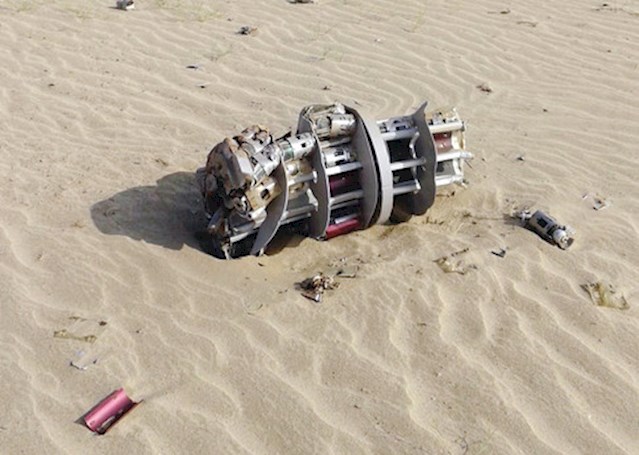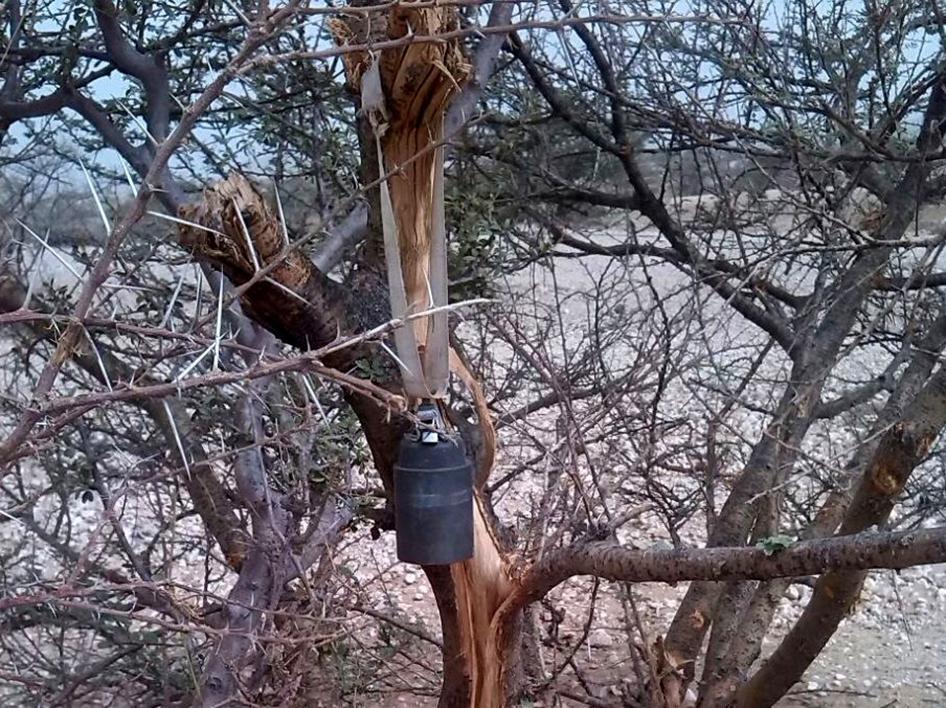
After a delay of more than six months Saudi Arabia finally admitted yesterday that its coalition forces have been using British-made cluster bombs in Yemen. A statement issued through the Saudi government news agency said the coalition had now "decided to cease usage" of those made in Britain but implied it will continue using cluster bombs supplied by other countries.
Cluster munitions pose a special hazard to civilians. They scatter bomblets over a wide area and bomblets which fail to explode at the time of the attack can still cause death and injury years after a conflict has ended. They are banned under the international Convention on Cluster Munitions which came into force in 2010.
Britain is a party to the convention but Saudi Arabia and other combatants in the Yemen war are not. The British-made cluster bombs pre-date the convention – they were supplied to the Saudis in the 1980s – but as a member of the convention Britain has a duty to discourage their use. Of the 21 states previously supplied by Britain, ten have since renounced cluster weapons but Saudi Arabia is not among them. Even so, non-members of the convention still have a duty under international law to minimise civilian casualties – which is difficult if not impossible to achieve when cluster munitions are used.
Yesterday's statement from Riyadh is a further embarrassment for the British government which seems determined to continue supporting the Saudi government (and supplying it with weapons) in the face of mounting evidence of war crimes.
The use of cluster munitions is one symptom of the coalition's apparent lack of concern for civilians in Yemen – a lack of concern which has also included targeting of hospitals and, last October, the attack on a funeral which killed at least 140 mourners and injured 500.
Evidence of cluster bombs in Yemen
The Saudi-led coalition appears to have been using cluster bombs almost from the start of its military intervention in Yemen on March 25 last year. During the first month evidence of their use began emerging from Saada province, a Houthi-controlled area bordering Saudi Arabia. Photographs examined by Human Rights Watch show the remains of two CBU-105 Sensor Fuzed Weapons manufactured by the Textron Systems Corporation. In 2013 the US had agreed to supply the Saudis with 1,300 of these bombs and also provided its coalition ally, the UAE, with an unknown number in 2010.
Saudi Arabia did not deny using these weapons but denied using them against civilians. Military spokesman Ahmed Asiri told CNN: "We do not use it against persons. We don't have any operation in the cities." He pointed out that the CBU-105 is designed to be used against vehicles (a single bomb is said to be capable of halting a convoy by spreading evenly-spaced "penetrator" explosives over an area of 60,000 square metres or more).
In a further report in August last year Human Rights Watch said dozens of civilians had been killed and injured by cluster munition rockets in the north-western province of Hajja. "Cluster munitions caused civilian casualties both during the attacks, which may have been targeting Houthi fighters, and afterward, when civilians picked up unexploded submunitions that detonated."
There had been at least seven attacks between late April and mid-July, HRW said. From examination of the remains it established that American-made M26 cluster munition rockets had been used:
"Each M26 rocket contains 644 M77 Dual Purpose Improved Conventional Munitions (DPICM) submunitions that are dispersed over a 200-by-100 meter area. A volley of six rockets releases 3,864 submunitions over an area with a one-kilometer radius.
"The M77 submunitions have a significant failure rate, up to 23 percent in US military testing, which means that unexploded bomblets remain in the area, posing a serious hazard until they are located and safely cleared."
Although it's unclear whether Saudi forces are equipped with M26 rockets, two of its allies in the war – the UAE and Bahrian – are known to have them. The Saudis did not respond to a request for comment from Human Rights Watch but a Pentagon official quoted by US News and World Report on August 19 said: "The US is aware that Saudi Arabia has used cluster munitions in Yemen."

Up to that point all the cluster munitions known to have been used in Yemen were American-made. In October 2015, however, Amnesty International said what appeared to be Brazilian-made cluster weapons had been used for an attack in Saada province, "wounding at least four people and leaving dangerous unexploded submunitions strewn around the surrounding farmland". Its report said:
"While Amnesty International was unable to independently verify with absolute certainty the make and model of the submunitions dropped ... they bear similarities to one manufactured by a Brazilian company called Avibrás Indústria Aeroespacial SA.
"The ASTROS II is a truck-loaded, multiple launch rocket system manufactured by Avibrás. ASTROS II can fire multiple rockets in rapid succession and three of its rockets can be fitted with up to 65 submunitions, with a range of up to 80km, depending on the rocket type. The company’s website describes it as 'capable of launching long-range rockets, designed as a strategic weapon system with great deterrent power'."
Avibrás had sold this type of cluster munition to Saudi Arabia in the past, and the kingdom was known to have used it during the war with Iraq in 1991.
An embarrassing discovery for Britain
In May this year, Amnesty established for the first time that British-made cluster weapons were also being used in Yemen after discovering the remains of a BL-755 bomb which had malfunctioned. It explained:
"The BL-755 was manufactured by Hunting Engineering Ltd in the 1970s. This variant, designed to be dropped from the UK Tornado fighter jet, contains 147 submunitions designed to penetrate 250mm of armour while at the same time breaking into more than 2,000 fragments which act as an anti-personnel weapon. The weapon is known to be in the stockpiles of both Saudi Arabia and the United Arab Emirates."
This prompted questions in the British parliament where two government ministers leapt to the Saudis' defence.
Philip Dunne, the Minister for Defence Procurement, told the House of Commons:
"Based on all the information available to us, including sensitive coalition operational reporting, we assess that no UK-supplied cluster weapons have been used, and that no UK-supplied aircraft have been involved in the use of UK cluster weapons, in the current conflict in Yemen."
Two days later defence minister Michael Fallon repeated the same statement almost word for word.
Alan Duncan, the UK's special envoy to Yemen, also chipped in to say that he had visited the operational targeting headquarters of the Saudi-led coalition "and have seen for myself the high professional standards being set by that operation". (The Americans, meanwhile, had been saying the opposite about the coalition's targeting.)
Faced with Amnesty's difficult-to-refute evidence of a British cluster bomb in Yemen, the government suggested it must have been left over from a previous conflict. Amnesty responded with a letter to the government explaining in detail why that could not be the case.
In the meantime, the government agreed to seek "fresh assurances" from the Saudis about the non-use of British cluster bombs. That process, started at the end of May, is what led to yesterday's admission that they had in fact been used.
That ought to result in some serious diplomatic pressure for Saudi Arabia and other combatants in Yemen to join the Convention on Cluster Munitions. But Britain, always wary of upsetting the Saudis, is unlikely to press very hard. Nor is the US, since it is not a member of the convention.
Aside from that, Amnesty International suggests countries using cluster weapons have a responsibility to help with subsequent clear-up operations:
"Saudi Arabia and other coalition members should facilitate clearance of areas contaminated by unexploded ordnance. States in a position to do so should provide all possible technical, financial, material, and other assistance to facilitate the marking and clearance, removal or destruction of cluster bomb submunitions, duds and other explosive remnants of war. They should also provide victim assistance, including for the medical and psychological care and rehabilitation of victims and their families, as well as risk education.
"Members of the Saudi Arabia-led coalition should immediately provide the UN with precise locations of cluster munition attacks, including maps, data with the exact dates of strikes, specific types and quantities of the weapons used, in order to facilitate clearance and risk-education activities and to reduce the potential for further civilian casualties."

 RSS Feed
RSS Feed
